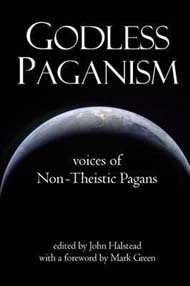Godless Paganism
Voices of Non-Theistic Pagans
Edited by John Halstead
with a foreword by Mark Green
Published by Lulu, 2016
Even in pagan antiquity, there were individuals and groups who, while
participating in the community's religious life, did not believe in literal
gods. In the centuries that followed the Christian domination of the
West, the epithet "godless pagan" was leveled at a wide variety of
people, from polytheists and indigenous peoples to heretics and atheists.
In the 1960s, however, there emerged a community of people who
sought to reclaim the name "pagan" from its history of opprobrium.
These Neo-Pagans were interested in nature spirituality and polytheism,
and identified with the misunderstood and persecuted pagans of
antiquity. Over the following decades, a stunning variety of spiritualities
blossomed under the umbrella of contemporary Paganism.
While many Pagans today believe in literal gods, there are a growing
number of Pagans who are "godless." Today, the diverse assemblage of
spiritual paths known as Paganism includes atheist Pagans or Atheopagans,
Humanistic and Naturalistic Pagans, Buddho-Pagans, animists,
pantheists, Gaians, and other non-theistic Pagans. Here for the first
time, their voices are gathered together to share what it means to be
Pagan and godless.
John Halstead is Editor-at-Large at HumanisticPaganism.com, a community
blog for Humanistic and Naturalistic Pagans. He was the
principal facilitator of "A Pagan Community Statement on the
Environment," which can be found at ecopagan.com. John is a Shaper of the
fledgling Earthseed community, which is described at godischange.org.
He also writes at Patheos, Witches & Pagans, Gods & Radicals, and
The Huffington Post.
(The text above comes from the back of the book)



